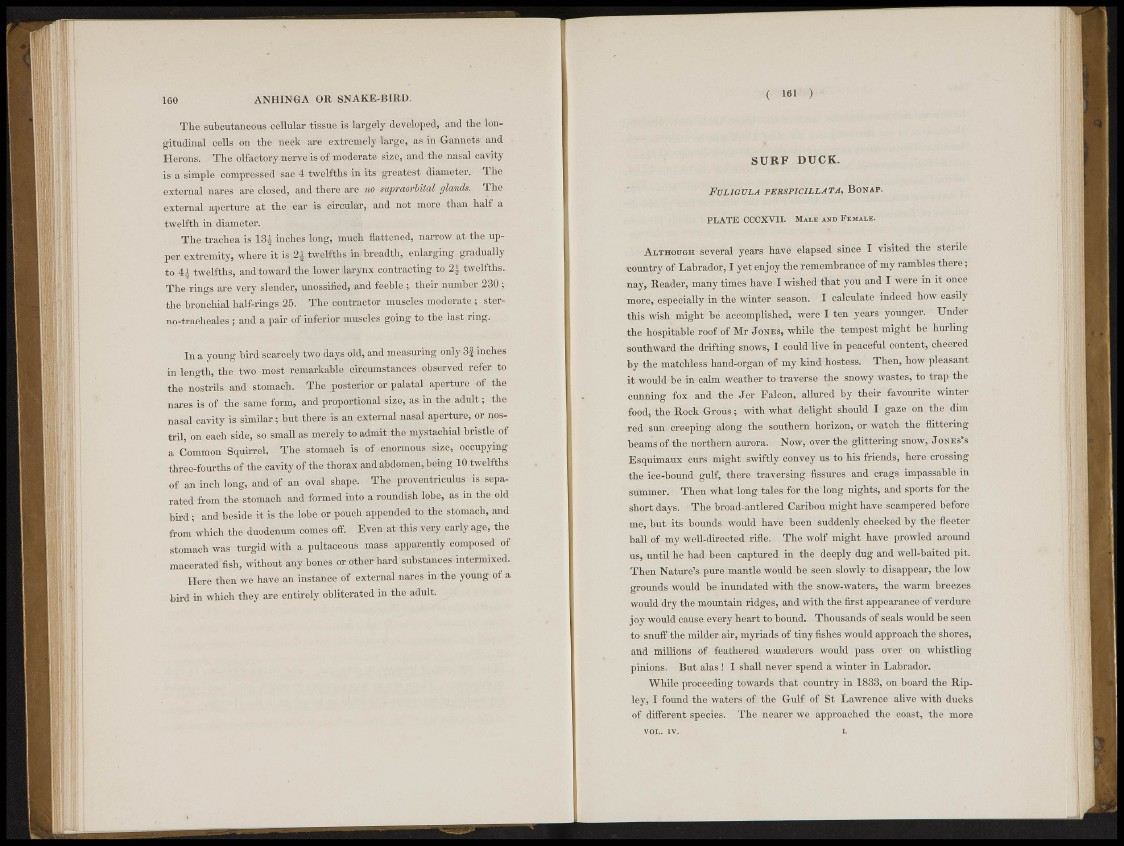
160 ANHINGA OR SNAKE-BIRD.
• The subcutaneous cellular tissue, is largiily dt;volo]>«'<l, ¡milifho longitudinal
atfe -extremely large, as in Gaiinets anil •
Herons. The olfactory -nerve is of moderate size, and #16 nasal cavity
is a simple compressed sac 1 twelfths-in its groatis'st diameter, THe
external lares :are closed, and there ¡ire no supraorbital </hn /- ft^*'
external aperture at the ear "f| circular, and not more than half a
twelfth in diameter.
The trachea-is 13$ inches iong, much flattened, narrow at t j j | tipper
extremity, where it is 2 J twelfth®!W|hre|ftth,; enlarging gradually
to 4J twelfths, arid toward the lower larynx contracting- to % twelfths.
The rings are very slender, unossitiod, and feeble; their number 230;
the bronchial half-rings '¿~>. The contractor muscles,.moderate; stprno
tracheales; and a pair of inferior muscles going to Jfgj: last ring.
IN a young1 bird scarcely two days old, and measuring only 3f inches
in length, the two most- remarkable <cil®umstances observed .refer to
the nostril» and stomach. The posterior or palatal- aperture |Jf the
nares -is: of the ;B8»e form, and proportional size, as in the adult; the
nasal cavity is similar; but there lis an external nasal aperture, or nostril,
on each s i d e , » small as merely to admit the mystachial bristle of
a Common Sijuirr.el,:. The stomach is of .enormous size, occupying
three-fourths of the cavity of the: thorax and abdomen,.being 10 twelfths-
„f a n inch long, and of an oval sjgpe. TAe iproventnculus is sepa.
rated from the stomach, and formed into aroundish lobe, as in the old
bird; and beside»'! is the lobe or pouch appended toKt-hc .stomach, and
from which the ducMenum comes off. Even.attHs veuy early age, the
stomach was turgid with a pultaeeous mass apparently composed of
macerated'fish, without any bones or other ku-d substances intermixed.
Here then we have an instance of external nares in. the young of a
bird in which they are entirely obliterated in the adult.
(v 161 )
S U R F DUCK.
FnLIGULJ PEBSl'ICILLATA, BoNAP.
PLATE CCOXVII. MALE AND FJSMAIE.
ALTHOUGH several years have elapsed since I visited the sterile
country of Labrador, X yet enjoy the remembrance of my rambles there;
nay, Reader, nianv times have I wished tiiat you and I were in it once
more, especially in the winter season. I calculate indeed how easily
this wish might be accomplished, were I ten years younger. Under
the hospitable rsfef of Mr JONES, while the tempest might be hurling
southward the drifting snoivs, I could live in peaceful content, cheered
fey the matddess hand-organ of my kind hostess. Then, how pleasant
it would be in calm weather to traverse the snowy wastes, to trap the
cunning fox -and the Jer Falcon,feallural by their favourite winter
food, the Rock GrotiS:; with what delight should X gaze on the dim
red sun creeping along the southern horizon, or watch, the flittering
beams of the northern aurora. liow, over the glittering Snow, JONES'S
Esquimaux curs might swiftly convey us to his friends, here, crossing
the: ice-bound gulf, there traversing fissures aid Wags1 impassable in
summer. Then what long tales for the long nights, and sports for the
short days. The broad-antlered Caribou might have scampered before
me, but- its bounds would have been suddenly checked by the fleeter
ball of my well-directed rifle. The wolf might have prowled around
us, until he had been captured in the deeply dug and well-baited pit.
Then Nature's pure, mantle would be ¡seek slowly to disappear, the low
grounds would be inundated with the snow-waters, the warm breezes
would dry the mountain ridges, and with the first appearance of verdure
joy would cause every heart to bound. Thousands of seals would be seen
to snuff the milder air, myriads of tiny fishes would approach the shores,
and millions of feathered wanderers would pass over on whistling
pinions. But alas! I shall never spend a winter in Labrador.
While proceeding towards that country in 1833, on board the Ripley,
I found the waters of the Gulf of St Lawrence alive with ducks
of different species. The hearer We approached the coast, the more
vol.. IV. I.